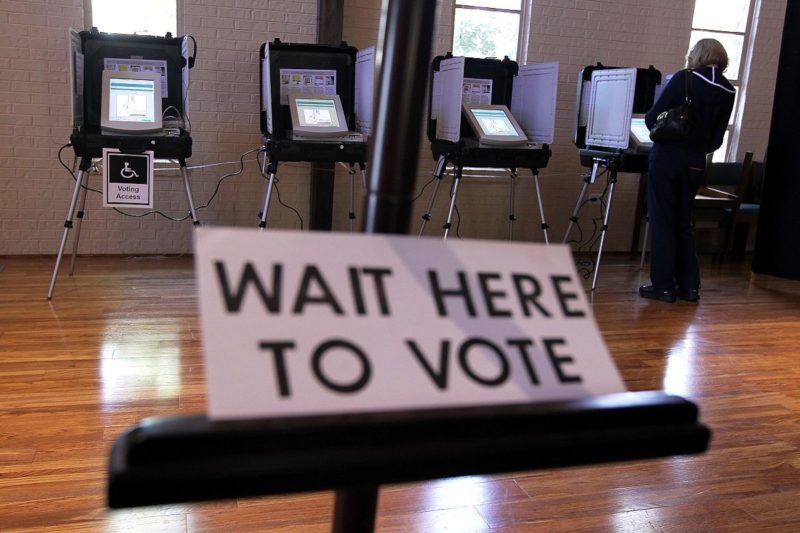Here’s How Republicans’ Gutting of Medicaid Could Affect Voters in Georgia Special Election
“People with developmental disabilities, we are having to fight for our lives right now."

Whoever is elected Tuesday in Georgia’s Sixth District runoff election—Republican Karen Handel or Democrat Jon Ossoff—will step into a national health-care debate that will determine the fate of popular parts of the Affordable Care Act (ACA) that have benefited people across Georgia.
The U.S. House version of the new administration’s American Health Care Act (AHCA), includes over $800 billion in cuts to Medicaid over ten years and makes health care once again inaccessible to many with preexisting conditions. The U.S. Senate version—which has been crafted secretly by select Republican lawmakers—is expected to receive a vote in the coming weeks, and will likely preserve the GOP’s gutting of Medicaid.
Georgia has one of the highest federal match rates, meaning the state relies heavily on the federal government to pay for its Medicaid program. The federal government covers nearly 68 percent of Georgia’s $9.8 billion Medicaid program, according to the Kaiser Family Foundation. One in five Georgians, including about half of all children in Georgia, rely on Medicaid for their health care. Any caps put in place by congressional Republicans would shift substantial costs onto the state, forcing Georgia policymakers to either spend more on Medicaid—by raising taxes or cutting other services—or make cuts to the program.
These cuts threaten the quality of life for Georgians with developmental disabilities who rely on Medicaid to pay for home health-care aides and other services, said Dawn Alford, public policy director of the Georgia Council on Developmental Disabilities (GCDD). More than 1.2 million people with disabilities live in Georgia, and around one-third of them rely on Medicaid, according to statistics provided by GCDD.
“People with disabilities, while we make up a smaller number of the enrollees, we make up a large part of the cost of Medicaid. So what that means is, any potential cuts to Medicaid are going to disproportionately affect us,” Alford told Rewire.
The gutting of Medicaid, Alford said, would include substantially cutting options for people to receive care in their home or community instead of in a nursing home or other institutional facility. Georgians with disabilities compose 19 percent of the Medicaid population, but make up 41 percent of the $9.8 billion program.
“People with developmental disabilities, we are having to fight for our lives right now,” Alford shared.
“I am not going to suddenly wake up tomorrow … and be able to care for myself. I am still going to need that care,” she said, pointing to the in-home care that she and others with disabilities receive from home health aide, like assistance with bathing or getting dressed.
States today are required to cover nursing home or other institutional settings for care. Many states, Georgia included, receive waivers from the federal government to use Medicaid funds to provide home and community based care to people with disabilities, but these services are optional.
“The way Medicaid is set up on policy level is that states are required to fund nursing facility care. So if you are a person like me and you need care to function in your daily life, you can go to a nursing facility,” Alford said. “If you are a Medicaid recipient, and you need that care, it must be an option to get that in the nursing facilities. … That’s not what I want for my life. I do not want to be in facility, I want to be able to work full time, I want to be able to live in my community, be surrounded by my loved ones and have a full life.”
There are already more than 10,000 Georgians on the waiting list to move out of a nursing facility and receive care in a home or community-based setting, according to the GCDD. Alford fears cuts will only cause this list to grow.
Neither the Ossoff or Handel campaign responded to requests for comment by press time. Campaign materials speak to very different priorities for the future of health care.
Ossoff in an interview on CNN said, “I think I would have supported [the ACA], but I can tell you this, there is plenty of room for improvement.” He states on his campaign website, “[I] will work to defend Medicare and Medicaid, ensure young people can stay on their family plan, prevent discrimination against Americans with pre-existing conditions, and ensure veterans swiftly get the care and benefits they’ve earned.”
Ossoff in debates with Handel has been less enthusiastic about some reforms plans floated by Democratic lawmakers, including the creation of a single-payer system. He has been critical of the Republican effort to repeal the ACA, or Obamacare.
Handel, meanwhile, has made criticism of Obamacare a central part of her campaign, writing on her campaign website, “Obamacare is the single biggest intrusion into the lives of Americans in decades.” She reiterated these points during debates between the candidates.
She is generally supportive of the AHCA, writing, “The current GOP proposal working its way through the House of Representatives remains a work in progress, but it is on the right track.”
The runoff special election is Tuesday.
